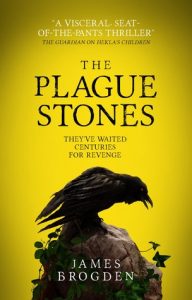
The Plague Stones by James Brogden
The Plague Stones by James Brogden
Hi All!
Today is my stop on the blog tour for The Plague Stones and I am here today with a fantastic guest post from the author!
 Title: The Plague Stones
Title: The Plague StonesAuthor: James Brogden
Publisher: Titan Books
Published: 14th May 2019
Pages: 496
Format: Paperback
Source:: N/A
Add It: Amazon UK Goodreads.
Summary:Fleeing from a traumatic break-in, Londoners Paul and Tricia Feenan sell up to escape to the isolated Holiwell village where Tricia has inherited a property. Scattered throughout the settlement are centuries-old stones used during the Great Plague as boundary markers. No plague-sufferer was permitted to pass them and enter the village. The plague diminished, and the village survived unscathed, but since then each year the village trustees have insisted on an ancient ceremony to renew the village boundaries, until a misguided act by the Feenans’ son then reminds the village that there is a reason traditions have been rigidly stuck to, and that all acts of betrayal, even those committed centuries ago, have consequences…
Five Books about Plagues
by James Brogden
We all love a good plague. There’s something uniquley terrifying about being at the mercy of something so completely out of our control. Partially it’s the sense of the enemy being diffuse – it comes from everywhere and nowhere, it can’t be focussed down into a single threat-figure like a monster or a serial killer, which makes it much harder to identify, avoid, or combat. But also it raises the unique spectre that the ‘enemy’ could very well turn out to be one of your loved ones – that once your husband, your daughter, or your great-aunt Bessie have become infected you are faced not only with a simple problem of survival, but also a moral conundrum. Do you stay with them in their hour of need, thereby most likely dooming yourself? Do you have to abandon them to protect other dependents like your children? On a wider level than that, it activates deeply buried social prejudices that we don’t like to examine in the healthy light of day: the fear of the Other. They are responsible for spreading this pesilence (think AIDS, SARS, Ebola, Bird Flu…) They must be stopped from coming in. They must be rooted out from our communities if our way of life is to be saved. In the current geopolitical climate the parable should be as obvious as a running sore.
With that in mind, here are a few plague-related stories on my bookshelves, in no particular order and totally unrepresentative of anything except my dubious taste in fiction:
1. World War Z: An Oral History of the Zombie War (Max Brooks)
Let’s get the zombie apocalypse out of the way first thing. Not that this isn’t a good book – it’s quite brilliant on a number of levels: stylistically, as an example of iron-tight research, and for what it says about the failure of countries and political entities to rise above nationalistic self-interest and cooperate in the face of a truly global catastrophe (coughglobalwarmingcough).
2. I Am Legend (Richard Matheson)
If World War Z is the sprawling widescreen, technicolour, cast-of-thousands epic, then I Am Legend is the claustrophobic indy character piece, and forget any of the movie versions you’ve seen, because it’s not about the vampires, not really. It’s about what happens when a person realises that the cause for which they’ve been fighting zealously has turned them into the monster, and yet Matheson manages to accomplish this with a pay-off finale which soars off the page instead of collapsing into meaningless nihilism.
3. The Stand (Stephen King)
I have to confess here, I am much more invested in the first half of King’s epic, as his characters struggle to survive their world falling apart, and the skill with which he interleaves their stories and brings them all together, than in the biblical allegory which follows, but maybe that’s just my godless atheism speaking. What I think makes this more chilling than the undead-virus trope is that the superflu which wipes out civilisation is basically that: a version of influenza, albeit souped up by an inept government laboratory.
4. The Death House (Sarah Pinborough)
This is a lovely, poignant, possibly dystopian coming-of-age novel set in an isolated institution where children are watched for signs of an illness which is never defined and is all the more powerful for that, because it’s not the illness which is important – it’s the way the characters respond to it and to a world which regards them with loathing and paranoia. I have yet to find a more succinct and elegant allegory for the agonies of adolescence.
5. The Girl With All the Gifts (M R Carey)
This book taught me the truism of never judging a book by its cover, and taught it to me hard. I almost dismissed it without reading on the grounds of it being yet another zombie-apocalypse story, or yet another ‘The Girl With/On/Under the Thing’ clone. Lucky for me that I didn’t, because again it’s so much more than that. No only is the mechanism of the plague elegantly realised and original, but it builds on Matheson’s vision of the ‘new people of the earth’ to deliver a dark sliver of optimism that humanity might be able to transcend the plagues that threaten us – those that come from the outside world and those which come from our own souls.



